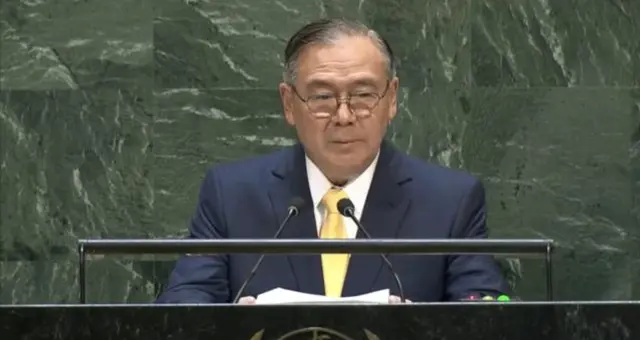By APD writer Melo M. Acuña
MANILA – “In ASEAN, we are still talking, knowing that talk – so long as we give up nothing vital in the process – does not hurt,” thus said Philippine Foreign Secretary Teodoro L. Locsin, Jr. before the United Nations’ 74th General Assembly yesterday.
He added they are still negotiating a Code of Conduct with China in the South China Sea.
“We’ve had incidents with swarming Chinese ships and lost a reef in our Exclusive Economic Zone (EEZ). But so far, we’ve had no interference in the joint exploration and development of oil and gas areas within our EEZ but China claims them as well,” he said.
The Philippine foreign secretary said he crafted a Memorandum of Understanding on Oil and Gas, which China accepted, that allows both parties to “move forward without the slightest compromise or diminution of our respective sovereign and international rights.”
He referred to the Code of Conduct (COC) as “a code of reality: the reality of the proximity of the soon-to-be biggest economy in the world in one place; with a commensurate industrial war-making capacity.”
Secretary Locsin said war is “a totally remote possibility” as all parties have built and achieved such material progress that none of the ASEAN or Asian countries, nor any outside power, “will risk losing the richest market in the world.”
He explained the Code of Conduct (COC) is a code of live and let live with China and have asked each ASEAN country and China “for mutual restraint and complete respect for UNCLOS, to which we are signatories binding ourselves unqualifiedly thereto, including China.”
Referring to the relentless anti-drug war launched by President Rodrigo Duterte since he assumed power last July 1,2016, which has been criticized by several countries and United Nations offices, Secretary Locsin said the aspiration of the vast majority of the Filipino people today, “call them shortsighted or just plain wrong, is to be free of drugs and safe from crime.”
In the same speech, Secretary Locsin said the United Nations should not allow itself “to threaten others with accountability for taking a tough approach to crime; instead of taking seriously what they cannot.”
He explained the Western proposition to end crime “is to legalize it.” He quipped “then it is no longer criminal.”
“Is that hard to understand? It seems impossible for some to accept. But the cartel can be persuasive in kind if not in reason,” he added.
He called for reforms in the United Nations because of “an increasingly complex security and global situation as conflicts now include non-state actors, “both violent and civil,” requiring the Security Council to adapt, reform and expand its membership.
Secretary Locsin said the Philippines is deeply concerned with the United Nations’ deteriorating financial situation as states “look to the UN to implement their priority agendas, peace and security and humanitarian assistance along with human rights and lately, sustainable development, climate action, migrants and refugees.”
He reported to the assembly the country’s poverty incidence fell from 27 percent to 21 percent from 2015 to 2018. However, he admitted President Duterte believes it is imperative to attend to six million Filipinos who are still very poor.
“And it can be done 9n a far greater scale than anyone thought possible. In 20 years, the new China lifted 800 million out of utter poverty into what is, by any economic indicator, a real middle class,” he said.
An effective strategy to lift people out of poverty is Education, he explained as he underscored efforts made by the government through basic education, free tertiary education in state colleges and universities as well as Alternative Learning System.
He likewise called on the international community to implement the Global compact for Safe, Orderly and Regular Migration.
(ASIA PACIFIC DAILY)
 简体中文
简体中文

